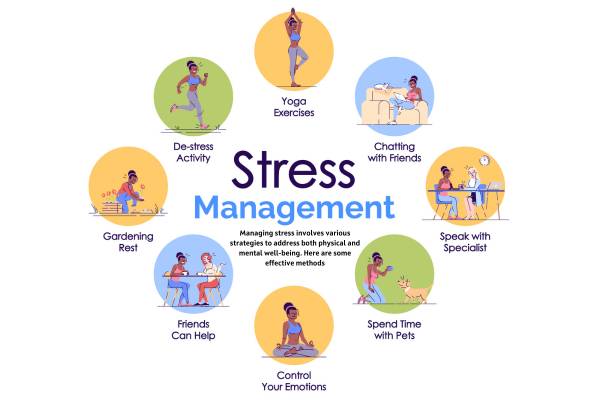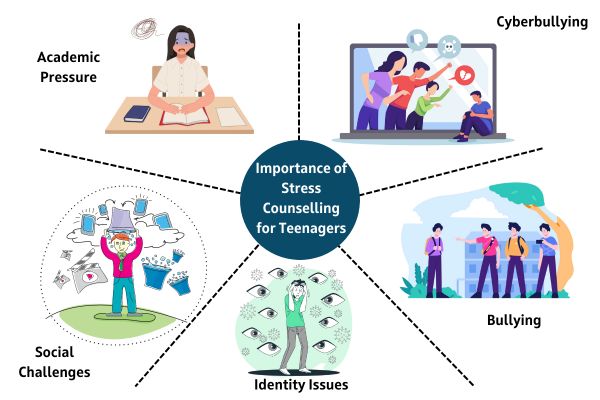Stress Counselling Singapore
Home > Counselling Services > Stress Management

Restoring Balance and Building Resilience Against Stress
“Stress is not what happens to us. It’s our response to what happens. And the response is something we can choose.” – Maureen Killoran.
Feeling overwhelmed, stressed, and ready to shut down?
You’re not alone. Stress can creep in silently until it feels like your plate is not just full — it’s overflowing. Some days, you’re on top of everything. Other days, even getting out of bed feels like a battle.
If you’re experiencing work pressure, emotional exhaustion, burnout symptoms, or constant anxiety, it may be time to seek stress counselling in Singapore. At Insightful Counselling, we provide work-related stress support, burnout recovery, anxiety management, and mindfulness-based stress reduction so you can slow down, reset, and rebuild your resilience with clarity and confidence.
When Coping Isn’t Enough
Stress has become a constant companion, and your usual ways of managing it no longer work.
Night after night, your mind races, keeping you from restful sleep as you worry about the endless tasks waiting for tomorrow.
It’s time to break the cycle.
At Insightful Counselling, we recognise that everyone experiences stress differently. Whether you’re overwhelmed by major life changes or struggling with smaller issues that still feel heavy, we’re here to help.
Your journey to recovery begins the moment you reach out.
With our expert care, you can transform your relationship with stress — not just manage it. Our licensed therapists provide personalised treatment to address your unique symptoms, helping you cope better and rediscover joy.
You deserve to feel calm, confident, and in control again.
Stress is a normal reaction to everyday pressures. However, it can become unhealthy when it upsets one’s day-to-day functioning.
Stress is your body’s automatic response to challenges, manifesting both physically and mentally. It arises from tension and worry when faced with threats or pressure. Often sparked by unexpected or new situations that challenge our stability, stress can stem from various life events—from managing numerous responsibilities and coping with illness to experiencing traumatic incidents such as natural disasters, pandemics, or acts of violence. Recognising and addressing stress early can prevent long-term damage. Discover how to navigate and alleviate stress effectively with our team of counsellors at Insightful.
In Singapore, post-Covid, stress has surged to become the third most significant health issue, affecting 35% of the population.
Different factors can trigger stress, and what triggers stress depends on the individual. However, some common causes of stress include:
- Work-related Issues:
– High job demands
– Tight deadlines
– Long working hours
– Job insecurity
– Conflicts with colleagues or superiors
- Financial Problems:
– Debt
– Unexpected expenses
– Inadequate income to cover living costs
- Health Issues:
– Chronic illnesses
– Acute medical conditions
– Mental health disorders
– Concerns about the health of loved ones
- Relationship Difficulties:
– Marital or partnership problems
– Family conflicts
– Friendships breaking down
– Loneliness
- Major Life Changes:
– Moving to a new home
– Changing jobs
– Divorce or separation
– Death of a loved one
- Environmental Factors:
– Noise
– Crowding
– Pollution
– Poor living conditions
- Personal Expectations:
– High self-expectations
– Pressure to achieve and succeed
– Perfectionism
- Daily Hassles:
– Traffic jams
– Misplacing items
– Minor accidents or mishaps
– Over-scheduling
Stress management and effective coping strategies can significantly improve mental health and well-being.
Physical Effects:
– Sleep Problems: Stress can cause insomnia or poor-quality sleep, affecting overall health.
– Example: “I struggle to fall asleep at night because I’m always thinking about my problems.”
– Body Related Problems: Stress can lead to headaches, stomach issues, and other physical problems:
– Example: “I noticed that whenever I’m under a lot of stress at work, I start getting severe headaches, and my stomach feels upset.”
– Fatigue: Finding yourself more tired than usual, even after a whole night’s sleep? Stress might be draining your energy reserves.
– Example: “Despite sleeping eight hours a night, I still wake up feeling exhausted. The constant stress from managing my workload is wearing me out.”-
– Muscle tension or pain: Feel like your shoulders are constantly up to your ears? Stress often tightens our muscles without us even realising it.
– Example: “I often get headaches and feel nauseous when stressed, making it hard to stay positive.”
Emotional Effects:
Stress can significantly impact emotions, leading to various effects:
– Anxiety: Persistent worry and fear about everyday situations.
– Example: “I constantly feel on edge and anxious about minor things, like running late or making small mistakes.”
– Irritability: Becoming easily frustrated or angry.
– Example: “I find myself snapping at my family for no reason when stressed out.”
– Sadness or Depression: Prolonged feelings of sadness or hopelessness.
– Example: “Stress from my job has made me feel down and uninterested in hobbies I used to enjoy.”
– Feeling Overwhelmed: A sense of being unable to cope with demands.
– Example: “I feel like everything is too much to handle, even simple tasks.”
– Restlessness: Difficulty relaxing or staying still.
– Example: “I can’t seem to sit still or focus on one thing when I’m stressed.”
Recognising these emotional effects is crucial for managing stress and maintaining mental health.
Mental Effects:
– Increased Anxiety: Chronic stress can lead to persistent anxiety, making it hard to relax or stay calm.
– Example: “I constantly worry about everything, from work deadlines to personal relationships.”
– Cognitive Issues: Stress can impair memory, focus, and decision-making abilities.
– Example: “I forget important tasks and have trouble concentrating when I’m stressed.”
– Burnout: Chronic stress can lead to burnout, characterised by emotional exhaustion and reduced performance.
– Example: “I felt completely drained and unable to keep up with my work responsibilities.”
– Lowered Self-Esteem: Persistent stress can erode self-confidence and self-worth.
– Example: “Constant criticism at work made me doubt my abilities and feel inadequate.”
– Substance Abuse: Stress can lead to an addiction to alcohol or drugs.
– Example: “I started drinking more to handle stress from my job, and now I rely on it to relax.”
– Social Withdrawal: Stress can make individuals withdraw from social activities and isolate themselves.
– Example: “I stopped hanging out with friends because I felt overwhelmed by stress.”
– Post-Traumatic Stress Disorder (PTSD): Severe stress from traumatic events can lead to PTSD.
– Example: “After experiencing a car accident, I had nightmares and avoided driving due to intense stress.”
– Complex Post-Traumatic Stress Disorder (PTSD): Chronic stress can contribute to the development of Complex PTSD (CPTSD) by repeatedly activating the body’s stress response. This continuous activation can overwhelm the individual’s ability to cope, especially if they face prolonged exposure to stressful situations or traumatic events. Over time, this can lead to symptoms such as heightened anxiety, emotional numbness, and difficulty in forming healthy relationships, all characteristic of CPTSD.
Example: “Constantly facing high-pressure situations at work for years left me anxious and numb. The chronic stress overwhelmed my ability to cope, leading to symptoms of CPTSD.”
– Jumping to Conclusions: This involves assuming the worst without sufficient evidence.
– “I always think my friends are mad at me when they don’t respond immediately.”
– “I assumed I failed the test because the professor looked disappointed.”
– Needing Control: Stress arises from trying to control everything, even the uncontrollable.
– “I get anxious when plans change at the last minute.”
– “I felt stressed when the weather ruined my outdoor event.”
– Self-Rating: Judging your worth based on achievements or others’ opinions.
– “I felt worthless after receiving critical feedback at work.”
– “I doubted myself because my presentation wasn’t perfect.”
– Procrastination: Delaying tasks until the last minute increases stress.
– “I stressed out finishing my assignment the night before it was due.”
– “I left my tax returns until the last day, causing unnecessary anxiety.”
– Negative Self-Talk: Constant self-criticism and focusing on flaws.
– “I kept telling myself I’m not good enough after making a mistake.”
– “I criticised myself for not being as productive as others.”
– Overcommitting: Taking on too many tasks leads to feeling overwhelmed.
– “I agreed to help with too many projects, but now I’m swamped.”
– “I committed to multiple events in one weekend, leaving me exhausted.”

Managing stress involves various strategies to address both physical and mental well-being. Here are some effective methods:
– Exercise Regularly: Exercise reduces stress hormones and improves mood.
– Practice Relaxation Techniques: Deep breathing, meditation, and yoga can calm the mind.
– Maintain a Healthy Diet: Balanced meals support overall health and energy levels.
– Get Adequate Sleep: Get 7-9 hours of quality sleep every night.
– Stay Connected: Social support from friends and family can provide comfort.
– Manage Time Effectively: Prioritise tasks and break them into manageable steps.
– Engage in Hobbies: Spending time on enjoyable activities provides a mental break.
– Limit Caffeine and Alcohol: Reducing intake of stimulants and depressants stabilises mood.
– Practice Gratitude: Focusing on positive aspects can shift your mindset.
– Listen to Music: Music is soothing and helps relieve stress.
– Take Breaks: Regular breaks prevent burnout and maintain productivity.
– Set Boundaries: Learning to say no and setting limits avoids overcommitment.
– Laugh More: Finding humour in daily life improves mood and reduces stress.
– Seek Professional Help: Mental health professionals like Insightful Counselling, are available to provide guidance.
We often cannot follow the usual methods to relieve stress. This may require more profound work, such as addressing negative beliefs, patterns, and communication styles. Professional stress counselling helps you understand your stressors, develop effective coping strategies, and reduce stress’s impact on your life. Benefits include:
– Improved Mental Health: Reducing stress can decrease symptoms of anxiety and depression.
– Better Relationships: Learning to manage stress can improve communication and reduce conflicts.
– Enhanced Well-being: Overall quality of life improves as stress levels decrease.
You can reduce stress and its impact on your daily life through a range of evidence-based therapies and practical techniques. Counsellors use different modalities depending on your needs, symptoms, and goals. These approaches help with work-related stress, burnout recovery, anxiety management, and overall emotional regulation.
Here are some commonly used methods:
Transactional Analysis (TA): Helps you understand your communication and relationship patterns, reducing stress that arises from interpersonal conflict.
EMDR Therapy: Works through unresolved memories, experiences, or triggers that may be increasing your stress response, offering emotional release and clarity.
Talk Therapy: Provides a safe and supportive space to explore stressors, express emotions, and build healthier coping strategies.
Cognitive-Behavioural Therapy (CBT): Identifies unhelpful thought patterns and behaviours and replaces them with balanced, effective ways of coping with stress.
Brainspotting Therapy: Helps process emotional tension, overwhelm, and deep-rooted stress stored in the body and nervous system.
Mindfulness Therapy / Mindfulness-Based Stress Reduction: Encourages grounding, breathwork, and present-moment awareness to regulate the nervous system and bring calm.
Hypnotherapy: Uses guided relaxation to reduce stress, anxiety and mental fatigue by shifting the mind into a focused, calm state.
These techniques can improve mental and emotional well-being, strengthen resilience, and enhance relationships by addressing both the symptoms and root causes of stress.
Ready to Feel More in Control?
If you’re feeling overwhelmed or stuck in survival mode, you’re not alone — and you don’t have to manage it by yourself.
Reach out to us today to book a stress counselling session and take the first step toward balance and clarity.

- Assessment: The counsellor identifies specific stressors, such as conflicts with a manager, fear of being fired, or anxiety about upcoming feedback.
– Example: “I was constantly stressed due to frequent disagreements with my manager.”
– Example: “I had a persistent fear of being fired, which affected my performance.”
– Example: “The anxiety over receiving upcoming feedback made me lose sleep.”
- Developing Coping Strategies: You learn practical techniques, such as time management, communication skills, and stress reduction exercises.
– Example: “I practised prioritising tasks to avoid feeling overwhelmed.”
– Example: “I improved my interactions with colleagues through better communication skills.”
- Addressing Underlying Issues: The counsellor helps resolve negative beliefs and patterns.
– Example: “We addressed my tendency to assume the worst in every situation.”
- Support and Follow-up: Ongoing support helps you apply these strategies and make lasting changes.
– Example: “Regular sessions helped me adjust my coping strategies as needed.”
These steps aim to improve mental health, enhance job performance, and increase well-being.

Teenagers face unique stressors, including academic pressure, social challenges, identity issues, bullying, and cyberbullying. Stress counselling can help teenagers develop healthy coping mechanisms and improve their mental health. It supports:
– Academic Pressure: Managing school-related stress.
– Social Challenges: Navigating peer relationships and social expectations.
– Identity Issues: Understanding and accepting personal identity.
– Bullying: Coping with and responding to bullying.
– Cyberbullying: Addressing the impact of online harassment.
By addressing these stressors, counselling helps teenagers build resilience and emotional well-being.
At Insightful Counselling Singapore, we provide comprehensive support to help you manage and reduce stress. Our experienced counsellors offer personalised programmes, effective techniques, and ongoing support to guide you on your journey to stress relief. We are here to:
– Guide You: Offering expert advice and strategies.
– Support You: Providing a safe and understanding environment.
– Work with Different Techniques: Using various approaches to delve deeper into understanding the triggers of your issues.
– Empower You: Helping you develop skills to manage stress independently.
– Follow-Up: Ensuring continuous progress and adapting strategies as needed.

Why Choose Insightful Counselling?
Insightful Counselling, Singapore not only provides treatment but also, WE CARE FOR YOU! Our approach is not limited to treatment, but we also make you self sufficient when it comes to handling any such situations in future.
- Boost your self esteem
- Help You Reorganize Yourself
- Help You Keep Calm in Worst Scenarios
- Encourage Positive Attitude
Live With Positive Mindset
Gaining stress relief may seem harder, but it’s not. You just need to learn eliminating the unnecessary stress that affects your body and make it work FOR you!
- Reframe Negative Thoughts
- Calm Down Your Mind
- Release Negative Energy
- Become a Strong Human Being

Our Counsellors for Stress Counselling



Mhairi Jerga, MSc (Counselling): Specialises in burnout, anxiety, and life transitions. She integrates CBT and mindfulness-based approaches to support emotional resilience. Mhairi brings warmth, cultural sensitivity, and deep compassion to her work with individuals navigating stress and overwhelm.
Insightful Counselling Success Stories for Stress Relief
Case Study: Lois’s Journey to Stress Relief
Lois (not their real name), a 45-year-old senior professional in Singapore, experienced severe workplace stress impacting their sleep and relationships. Seeking help from Insightful Counselling Singapore, Lois engaged in personalised sessions and learned effective stress management techniques such as CBT, EMDR therapy, talk therapy, transactional analysis therapy, and mindfulness exercises.
After the therapist established a therapeutic relationship, with the help of Transactional Analysis, Lois discovered their low self-esteem was linked to an inner Critical Parent subduing their inner Child, triggering beliefs like “I am a failure, I am not important, I am not good enough.” These were the root causes of Lois’s stress. With therapeutic work, including Inner Child work, EMDR therapy, maintaining a diary, and exploring relaxation tools, Lois saw significant improvements over several months. Their stress levels decreased, sleep improved, and communication at work enhanced.
Lois’s experience highlights the transformative power of professional stress counselling.
FAQs about Stress Counselling at Insightful Counselling Singapore
The duration of stress counselling varies based on individual needs and the severity of stress. Typically, clients may see improvements within a few sessions, but ongoing support might benefit long-term stress management.
During your first session, you can expect a comprehensive assessment of your stress levels, a discussion about your stressors, and an outline of a personalised stress management plan.
Online stress management therapy offers flexibility and convenience, allowing you to receive support from the comfort of your home. Our online services are as effective as in-person sessions and tailored to your needs. Benefits include:
– Convenience: Access therapy from anywhere.
– Flexibility: Schedule sessions that fit your timetable.
Yes, online stress counselling can be just as effective as in-person sessions. It offers flexibility and convenience, allowing you to receive support from the comfort of your home.
At Insightful Counselling Singapore, we offer affordable stress counselling services to ensure everyone needs the support. Contact us to discuss our pricing and find a plan that works for you. We provide:
– Flexible Pricing: We offer options to suit various budgets. Our services start with pro bono sessions provided by our intern counsellors (students studying to be counsellors). Additionally, we have counsellors with different experience levels to cater to diverse financial needs, ensuring a suitable budget for everyone.
– Accessible Services: Ensuring support is available to all.
Suppose you are experiencing persistent stress that affects your daily life, relationships, or health. In that case, it may be beneficial to seek professional stress counselling.
Stress counselling may incorporate various techniques, including cognitive-behavioural therapy (CBT), talk therapy, transactional analysis therapy, EMDR therapy, mindfulness exercises, relaxation techniques, and lifestyle modifications.
Yes, stress counselling can help manage and reduce chronic stress by teaching effective coping strategies and addressing underlying causes of stress.
Yes, all sessions at Insightful Counselling Singapore are confidential. Your privacy and confidentiality are of utmost importance to us.
You can schedule an appointment by visiting our website, calling our office, or emailing. We strive to accommodate your schedule and provide timely support.
The cost of stress counselling varies depending on the type of service and duration. We offer affordable options and can discuss pricing during your initial consultation.
If you or someone you know is experiencing stress, don’t hesitate to reach out. Insightful Counselling offer expert services in mental health wellness and stress management. You can contact us at +65 (83287060) for more information. Seeking professional help is a positive step toward emotional well-being.
Take the first step towards a calmer you. Book your session now.
Testimonials
My experience with Stress Right has been transformative, thanks to Reena. Her approach is marked by understanding and zero judgment. She expertly balances offering practical advice with simply being a supportive presence. Reena gently encouraged me to step out of my comfort zone without ever making me feel pressured. She quickly identified my issues and guided me on how to address them. With her help, I have gained confidence and resilience, learning valuable coping techniques. Reena's support has been a constant comfort, making me glad I chose counselling. I highly recommend Reena to anyone struggling. She has truly changed my life.
I just wanted to share my experience working with you on my fear of flying. Your hypnotherapy and relaxation techniques made such a huge difference! Before, I was terrified, even thinking about getting on a plane. But thanks to our sessions, I felt genuinely relaxed and in control during my recent flight. It was a completely different experience. Your support and guidance have been amazing, and I can't thank you enough for helping me overcome this fear.


